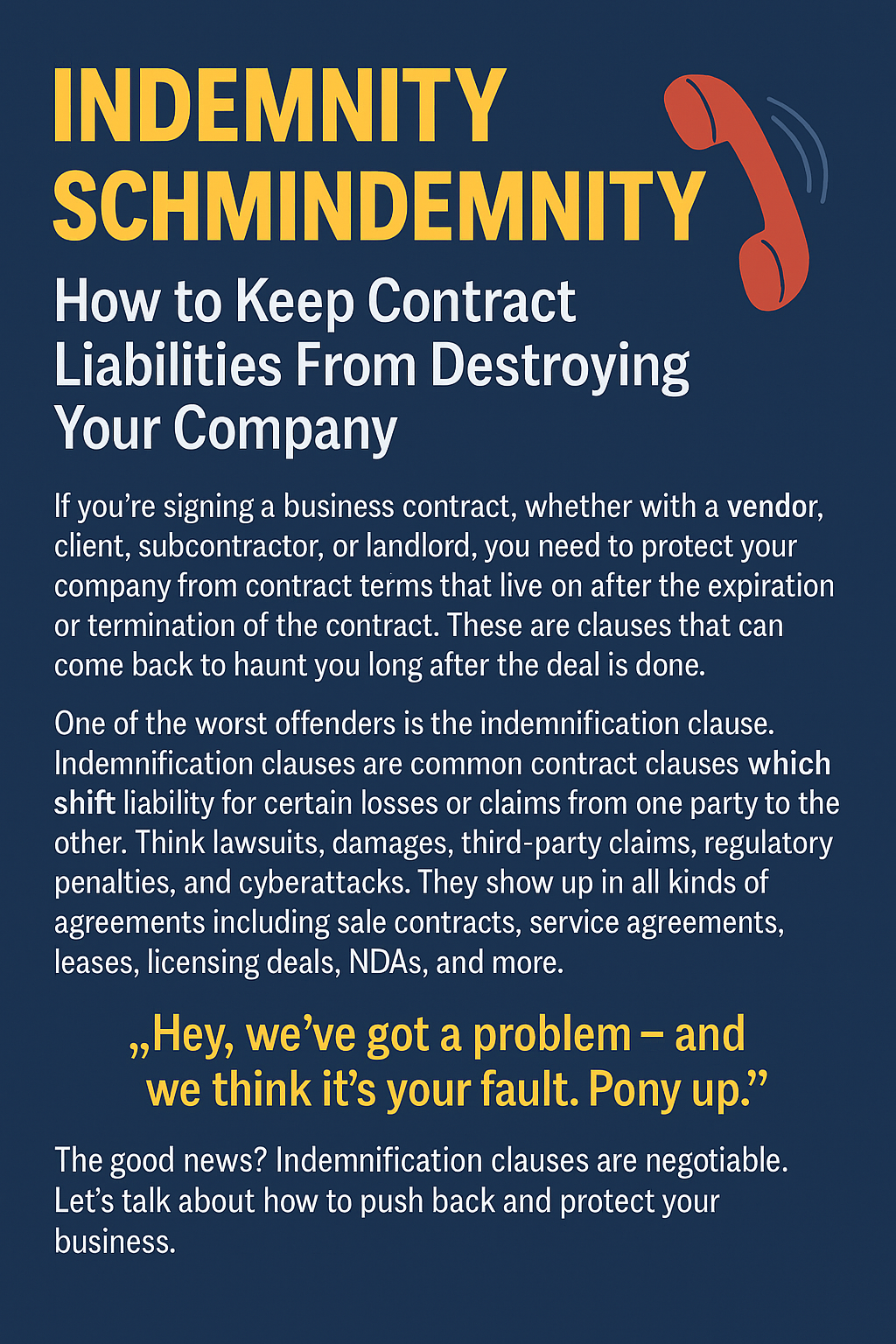What Every Business Owner Should Ask Their Business Attorney in 2024
Running a business involves much more than coming up with a great idea and following it through. There are a lot of legal questions and issues that will come up as you go along. But to get you started, we have listed some questions you should ask your business attorney today. We’ve included some answers plus some tips that you can put into place right away.
Do I have adequate corporate formalities in place?
This issue here is whether you are adequately protecting your personal interests. When you start a company, it’s important that you legally separate yourself (as the owner) from your business. If you don’t and find yourself in a sticky situation like business bankruptcy, you risk having your important personal assets being taken away from you as collateral. And no one wants that.
Should I create separate company bank accounts?
If you haven’t already, you need to open a separate business bank account for your business. Not only will it help you better track your cash flow, but you can save a lot of time when tax season rolls around. Having a separate bank account solely for your business will also make your accountant or bookkeeper’s job much easier.
As your business grows, it will be harder and even more time-consuming to separate your personal expenses and your business expenses. Also, if you ever need to apply for a loan or want to sell your business, having a separate business bank account will be essential. Set yourself up for future success by setting up that account now.
From a tax liability standpoint, you’ll also be able to identify tax deductions much more easily.
Am I required to hold an annual meeting?
If your company is organized as a corporation, the short answer here is “almost certainly.” Before we jump into the specifics, be aware that different states have different laws regarding annual meetings. This is another reason why you need to work with a competent business attorney who is aware of your particular state’s laws.
If your company is organized as an LLC, technically you probably won’t be required to hold an annual meeting, (unless it’s stipulated in your business’s Operating Agreement), but it is almost always a good idea.
In most states, if you forget to hold an annual meeting each year, you should just have the meeting as soon as possible. However, your company’s bylaws will usually have a section in regard to annual meetings, and there may be a specific date set forth there. Make sure to read it carefully.
If you are organized as a corporation, you will typically have both a shareholders’ annual meeting and a board of directors’ annual meeting on the same date. In those meetings, you will likely talk about:
- The company’s annual state filing and tax reporting.
- The election of the board of directors.
- Any major business decisions the shareholders need to vote on.
- Any major business decisions the directors need to vote on.
You should always have a written record or meeting minutes. This is a written record of what happened at the meeting. Before the meetings, discuss what needs to be discussed at the meetings with your attorney. After the meetings, send your minutes to your business attorney so that they can review it and keep it with any other important corporate documents they have on file for you. This can help if there’s ever a discrepancy about what was agreed on at the annual meeting.
What is an annual report? Am I required to submit one?
All statutory business entities are generally required to file an annual report to the business entity filing office in the state that they do business in. This includes corporations, non-profits, LLCs, limited partnerships (LPs), and limited liability partnerships (LLPs). If you operate several states, you’ll generally be required to do the same in each state in which you do business.
The annual report filing is meant to provide the public, any investors, and applicable government entities specific information about your business. In a very few states, you will not be required to file an annual report with the state. Your business attorney will be able to tell you the specifics of what your state requires in order for your company to remain compliant.
How should I document major business decisions?
You don’t need to document every decision you make in your business. For example, shareholders and the IRS most likely don’t care about the new carpet you installed in your office. However, there are other, much more important decisions that should always be recorded. These can include:
- The company annual meeting’s minutes.
- When stock is issued.
- When real estate is purchased.
- Information about any loans or credits issued.
- When a new stock or retirement plan is adopted.
- Any important tax decisions.
When you document important business decisions, you protect yourself from any future issues. Just like setting up a separate bank account, taking these steps will help to protect your personal assets from anything that may come up with your company. Also, if there are ever any issues with the IRS or creditors, you’ll have the documentation to back you up. Remember to always send your business attorney copies of all your major business decisions!
Do I have adequate succession/exit and disaster recovery plans in place?
This issue is what would happen if you were no longer able to run your business. This may happen because you die or become disabled, a natural disaster or cyberattack wipes out your infrastructure, or when you decide to sell your company.
One thing we need to clear up is the difference between a continuity plan and a succession plan.
A continuity plan ensures that your business will continue to run in the face of a catastrophe. It’s about making sure that your clients will continue to be served if you die or become disabled and are otherwise no longer able to run your company. It’s a bit morbid to think about, but you know what they say about not being prepared.
A succession plan is a bit different. It ensures that not only will your clients continue to be served if you’re suddenly not around, but that you will be replaced by a competent individual (or individuals) who will take on leadership in the company. Think of it like a very detailed exit plan. Even if nothing happens to you, a good succession plan ensures there will be a smooth transition of the ownership of the business to your heirs or to the buyer of your business.
What can I do to get ready to sell my business?
It may feel odd to prepare to exit your business, but you should always begin with the end in mind. When you are ready to sell, it will make the actual selling process a lot more straightforward. Here are some things to keep in mind:
Always think of new ways you can increase your profits and cut your costs. Obvious, but it needs to be mentioned!- Document in writing any processes or systems that you have in place. This will help make potential buyers feel more at ease because they will have a road map in place for running the company once you’re out of there. Most people want to buy a business, not a job, so make sure that you’re implementing processes and systems that will help your company run without you.
- Make your company a great place to work. Buyers won’t want to take on a business with a high employee turnover rate.
- Know your business’s assets, both physical and non-tangible. These assets will help determine the sale price of your company.
- Put yourself in the buyer's shoes: Would you want to buy your business? If yes, great. If no, why not?
What is keyman insurance? Do I need it?
Keyman insurance is an insurance policy that’s directed at small businesses. These policies are designed to compensate the company if a “key” person dies, becomes disabled, or is no longer able to carry out their role. This could include an owner, member of the board, or a highly specialized employee.
Having a keyman insurance policy in place can help make sure that day-to-day operations continue, any outstanding debts are paid, and will pay for any expenses required to find a suitable replacement person.
So, do you need it? Think of keyman insurance as another risk management tool. You’ll be happy you have it in the face of a disaster or death. At the end of the day, it’s a judgment call, so it’s up to you to decide if you need it or not.
What happens if I want to sell my business to a family member?
If you’d like to keep your business in the family by selling it to a family member, the process is a lot like selling to a third-party. Training the next generation and financing the purchase can be tricky, however, which is why it is important to have in place a good succession and training. So don’t wait. Put that succession plan in place now and stick with it. And don’t forget to keep your business attorney (and probably your financial planner too) in the loop at all times.
Do my contracts adequately protect my company’s interests?
This is another area where your business attorney can really come in handy. He or she can work with you to review and revise, as needed:
Your employee and independent contract agreements.- Your service provider contracts.
- Your building lease agreement.
Your business attorney can also help you review your company’s formation documents, including your articles of incorporation and your bylaws, meeting minutes, and corporate filing, and help you resolve any ongoing or anticipated stockholder or ownership disputes.
Your business contracts, if properly drafted, will go a long way toward protecting your company’s interests as well as your own. Long gone are the days of cementing a deal with a verbal agreement and a handshake. You need to get any important decisions and agreements down on paper and make sure they are crafted with the knowledge your business attorney can provide.
Should I put my business contracts in my name or the company’s?
Along the same lines of separating your personal bank account from your business’s, you should always make sure that your business contracts are in your company’s full, legal entity name. That includes adding LLC, LLP, Inc., or Corp. where necessary.
How do I ensure there are confidentiality provisions in my business contracts to protect my secret sauce?
One great way to help you protect confidential information related to your business (AKA your secret sauce) is to make sure that you put in place confidentiality agreements. You may have heard it referred to as a non-disclosure agreement. If you ever disclose confidential information (with say, an employee or service provider), you should always have them sign one. You can ask your business attorney to draw one up for you.

If a SaaS company has access to my data, who owns that data?
Software as a Service (SaaS) companies are popping up everywhere. You may be wondering about the nitty gritty details of the agreements you enter into with these types of companies. In most cases, probably, although you upload your data into the SaaS’s cloud, there is a good chance you will probably still own that data. However, you should always make sure. Your contract with the SaaS company should clearly state that you retain ownership of the data you share with them. Again, your business attorney can help you look over the SaaS agreement before you sign.
What vendor or sales agreements will automatically renew this year?
Some of your vendor, sales, and other agreements may automatically renew, thus putting you on the hook to pay for another year of service without your knowledge. This can be great convenient if you’re happy with your vendor or service provider and their pricing. It can backfire, though, when you aren’t happy and want to move on once the agreement has run its course.
So, when a contract, always read it through very carefully. Your business attorney probably reads these types of agreements all day, so make sure to bring them in before you commit.
Also, even if you’re happy with your current contract, contract renewal time can be just the time to negotiate better pricing. So, set up ticklers to remind yourself when each of your contracts ends or automatically renews so you don’t miss these opportunities.
What’s an assignable contract?
Assignable contracts contain provisions to allow the contract holder to transfer or “assign” the rights (and obligations) of the agreement to someone else. This can be a nice feature to have, especially when you are selling your business. Keep this in mind when signing a vendor or sales agreement.
Do I have adequate Intellectual Property protections in place in my business?
Your Intellectual Property (IP) includes not only your patents, trademarks, and copyrights, but also your ideas, inventions, designs, and color schemes you may use in your business. It can (and should) be protected at all times. Some steps you can take to put adequate IP protections in place are to :
Trademark your name and logo.
Have your employees and vendors sign a confidentiality agreement.
Pun in place non-solicitation and non-compete agreements.
Researched to see if proprietary processes are patentable.
Never underestimate the power and value of your intellectual property rights!
Do I have adequate data security processes in place?
Employment regulations are complicated and there are a lot of them. Again, consider a few important questions:
Does your company have an employee handbook? Is it current? Have all of your employees signed it?
Are your onboarding processes compliant with state and federal regulations?
Do you have written sexual harassment policies ? What are they? Do you follow them consistently? Do you have the documentation to back it up?
A business attorney will be able to help you navigate the maze of employment regulations and help you remain compliant.
Am I in compliance with all applicable online regulations?
Am I in compliance with all applicable state and local business regulations?
We touched briefly on this already, but all states have different business laws and regulations. Things can get complicated if you open your business in one state and operate in another state (i.e., a “foreign” state). You need to make sure that you’re compliant with the laws in each state where you do business. It’s also important to comply with local business regulations.
A good business attorney can help you stay compliant with all of these laws.
Summing it all up.
At the end of the day, a good business attorney will simply make your life as a business owner easier.
If you’re on the hunt for a business attorney, we’d be happy to accompany you on your legal journey. One of our specialties is translating legal jargon into terms that you understand. Sounds good, doesn’t it? Click here to learn more or set up a call with one of our experienced attorneys today.
This blog post is not legal advice and does not create an attorney-client relationship.
7301 Mission Rd 244 M
Prairie Village, KS 66208
All Rights Reserved | Ralph F. Munyan Attorney At Law, LLC










